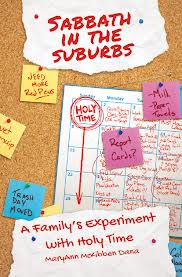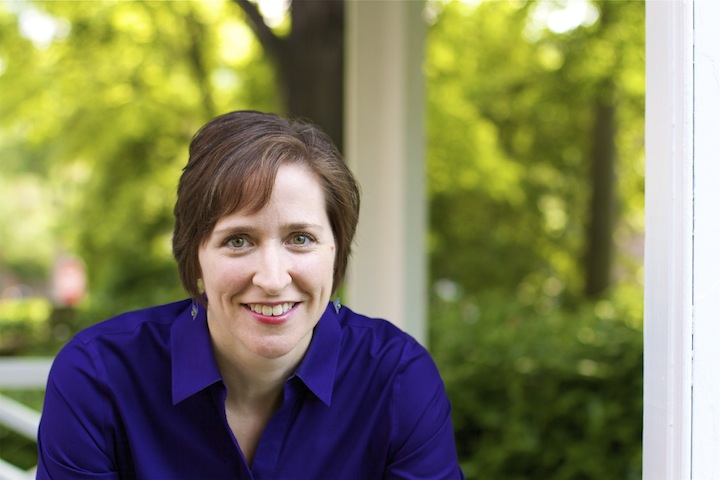Sabbath in the Suburbs: A Conversation with MaryAnn McKibben Dana, Part II
 Editor’s note: Our subject this week is MaryAnn McKibben Dana’s book, Sabbath in the Suburbs: A Family’s Experiment with Holy Time (Chalice Press, 2012). Here, some of our conversation on some of the issues raised in the book.
Editor’s note: Our subject this week is MaryAnn McKibben Dana’s book, Sabbath in the Suburbs: A Family’s Experiment with Holy Time (Chalice Press, 2012). Here, some of our conversation on some of the issues raised in the book.
What ideas do you have for families dealing with the special needs or disorders of their children, where illness takes precedence at times when you’re supposed to have Sabbath? Or for people whose aging or sick family members, parents or others, require a lot of time and energy? Or – and this is the kicker – families like mine, who are dealing with both at the same time?
I get asked this a lot, whether by parents whose children have special needs, or people caring for aging parents, etc. I’d love to turn the question around to you and your wisdom, Cynthia. What do you hear in this Sabbath stuff that’s relevant and what isn’t? And what in it is downright harmful? Some of our language around spiritual practices can get wrapped up in “should,” leading to people feeling doubly burdened by a tough situation, plus feeling like they’re not holy enough.
I will say that Abraham Joshua Heschel, who wrote a lot about Sabbath, said that the Sabbath is not just a date, but an atmosphere. What that suggests to me is that there may be times when scheduling Sabbath is impossible. But that atmosphere can sneak up on us in random moments when we least expect it. I call this “living sabbathly” in the book. Living sabbathly in my experience doesn’t mean that everything is peaceful bliss. But there is, at least, an attentiveness to the moment. Living sabbathly means being present. The trenches of a mental health crisis can be intense and grueling. But I also know that it’s when we’re most desperate for grace—any grace—that God seems to show up somehow. Noticing and naming those moments, however rare and however fleeting, feels important to me, and it feels like the work of Sabbath.
On a practical level, though, yes—Sabbath can get interrupted by a family member’s acute needs. I encourage people to see that as a postponement rather than a cancellation. I don’t like reducing Sabbath to a “put on your oxygen mask first” thing, because it’s deeper than that. But in the case of someone who’s having to give a lot of energy, care and love to someone in need, Sabbath is a part of self-care.
 Talk about how your family’s Sabbath practice has been impacted by your travel schedule, and what it might mean for a family where parents have to work multiple jobs, often for low wages, to make ends meet. How can Sabbath work for these families, or for you, as your travel schedule increases?
Talk about how your family’s Sabbath practice has been impacted by your travel schedule, and what it might mean for a family where parents have to work multiple jobs, often for low wages, to make ends meet. How can Sabbath work for these families, or for you, as your travel schedule increases?
I hear often from people who just don’t see how to make it work. Often they have in mind an ideal view of Sabbath—a day-long abstention from work, every single week. That feels out of reach for a lot of people, including us, to be honest. As our kids get older, our lives get more complex, and as I travel more to lead conferences and workshops, we are not taking a day-long Sabbath every week. Rather it’s woven into the texture of our week—an evening here, a Sunday afternoon there. And that’s what I encourage people to think about too. Maybe a weekly day-long Sabbath is impossible. But what about half a day? What about an evening? What about a Sabbath every three or four weeks? (Get it on the calendar.)
Or maybe a day without any work is impossible if you hope to have, say, clean laundry and groceries in the fridge. In this case, I invite people to think about Sabbath as a day to bring themselves into a sense of balance, even if they end up doing work during that time. So maybe for someone who’s running around all week, Sabbath is simply an at-home day—even if you’re doing chores or other labor. Or you can think about Sabbath as a time to fast from something. Some folks may opt to fast from the Internet, for example. What brings you delight and draws you closer to God? What drains your energy and draws you away from God? Ponder those questions and see where they take you.
On a public policy level, the United States is the only OECD country that provides no guarantee of paid time off for its workers. And don’t get me started on maternity and paternity leave! (Which isn’t exactly Sabbath time, but it’s related.) I would love to see the church offer more of a prophetic voice in terms of affirming a work-life balance. I’m a bit pessimistic about the potential for movement in this area, however—partly because there are other issues that feel more urgent, partly because these issues are still seen as a matter of personal choice rather than a matter of public policy, or even of broadly accepted societal norms.
The recent discussions about Black Friday (and Thursday) highlight this dynamic. I had lots of friends who chastised the anti-Black Friday brigade—of which I am one—because of economically disadvantaged folks who rely on Black Friday sales to get good deals on items wealthier people take for granted, and because of workers who choose to work on Thanksgiving for the overtime pay they receive. To which I respond, why are we framing these issues in this way? Is a Thanksgiving door-buster sale really the only way we can come up with to help poor people take part in our economy? Can we work to ensure a living wage for the workers all year long, rather than making it sound like the department stores are doing these folks a favor by giving them the option to work on a national holiday?
The Black Friday/Thursday issue is a red herring and a distraction from the larger issues of poverty, compensation, and yes, leisure time, which as I said in an earlier question, is wrapped up in issues of wealth and privilege.


Pingback: The Sabbath is Not Just a Date, and Black Friday Backlash-Backlash | MaryAnn McKibben Dana